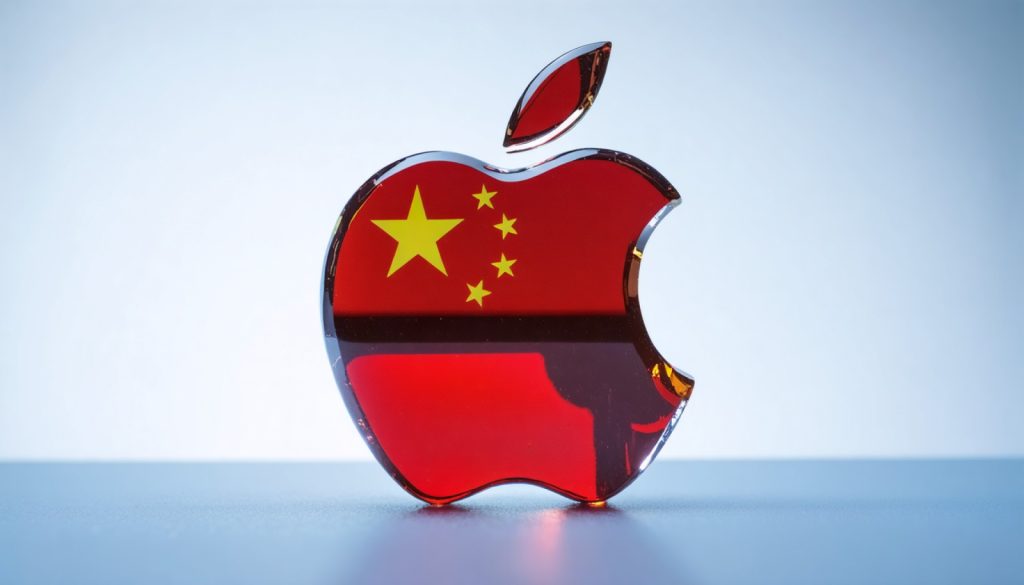
- Apple stands at the center of tech and political tensions, with criticism from Senator Elizabeth Warren regarding its relationship with the Trump administration amid U.S.-China trade talks.
- Trade tensions impact investors and provoke concerns about future global economic shifts, particularly in the tech sector.
- Apple faces supply chain challenges affecting iPhone 17 production due to a shortage of Low CTE fiberglass cloth, impacting market availability.
- Tesla encounters supply chain issues and China’s export restrictions on rare earth materials, affecting its autonomous driving and robotics aspirations.
- Successful earnings from companies like Alphabet and IBM contrast with the geopolitical strains affecting the market.
- Geopolitical dynamics create a complex environment, with interconnected corporate actions and trade policies influencing global commerce.
- The narrative reveals the uncertainty and high stakes in navigating these challenges, impacting future technological and economic developments.
The intricate dance between technology and global politics continues to unfold, with Apple once again standing at the epicenter. Massachusetts Senator Elizabeth Warren has raised questions about what she describes as a pattern of influence-peddling between the tech giant and the Trump administration—a questionable choreography amidst the broader stage of U.S.-China trade negotiations. The words leave an echo that demands attention, drawing into question the ethical balance of power and profit.
Meanwhile, the specter of trade tensions lingers ominously above Wall Street, as tech analysts like Dan Ives speculate about a ticking clock running short on seconds. With each missed trade deal, the reverberations threaten to reshape global economic landscapes, compelling investors to reconsider their strategies.
While corporate giants like Alphabet, T-Mobile, and IBM delight with earnings reports surpassing expectations, the tumultuous undercurrents of geopolitics can be felt nowhere more keenly than in Tim Cook’s world. The CEO of Apple grapples with the complex implications of supply chain bottlenecks affecting the latest iPhone 17 series. This time, the scarcity of a humble material—Low CTE fiberglass cloth—creates a shortage of Apple’s iconic devices, leaving both the market and consumers in a state of suspense.
The narrative threads across various industries, offering no respite. In the automotive landscape, Tesla faces supply chain challenges that threaten its ambitions for autonomous driving dominance. Even as it endeavors to boost production of the Optimus humanoid robot, supply constraints and China’s export restrictions on rare earth materials pose substantial roadblocks. Meanwhile, the automotive world is abuzz with Tesla’s autonomous ride-hailing pilots in Austin and the Bay Area, underscoring the rapid evolution in transportation.
The ripple effects of these dynamics are vast. As each corporate earnings report beats expectations, the market braces for potential headwinds brought on by geopolitical strains. Even as the electric vehicle and tech sectors explore uncharted territories, the uncertainty of trade relations looms large, casting a shadow over the future of global commerce.
Ultimately, what emerges from this elaborate dance is a narrative of interconnectedness. Apple, Tesla, and their peers do not operate in isolation; instead, they are players in a global symphony where trade policies, technological innovations, and geopolitical tensions create a complex, ever-evolving soundtrack. The question remains: as the world watches, will the conductors of commerce navigate these turbulent waters with deft precision, or will the discordant notes prevail? The stakes have never been higher, nor the outcomes more unpredictable.
Unraveling the Web: How Geopolitics and Supply Chains Are Reshaping Tech Giants
The Intricate Dynamics Between Tech and Geopolitics
1. Understanding Apple’s Dilemma: Apple’s involvement in geopolitics is not new. The company’s deep integration into the global financial ecosystem makes it vulnerable to geopolitical strains, such as the ongoing U.S.-China trade tensions. This has led to scrutiny over its negotiations with various administrations, most notably during the Trump era, which now face ethical questions regarding influence-peddling (Economist).
2. Supply Chain Challenges and the iPhone 17: The shortage of Low CTE fiberglass cloth impacting Apple is indicative of a broader issue in tech supply chains. This particular material is vital in ensuring the structural integrity and performance of electronic devices, and its shortage not only delays product launches but also affects pricing and profitability.
Tesla’s Autonomous Dream Amid Material Constraints
1. Tesla’s Supply Chain and Production Ambitions: Tesla’s challenges with rare earth materials significantly impact its plans for autonomous technology and innovations like the Optimus humanoid robot. Rare earth materials are crucial in manufacturing motors and sensors, pivotal for electric vehicles and robotics. China’s export restrictions exacerbate these challenges, influencing Tesla’s production timelines and costs (The Verge).
2. Autonomous Ride-Hailing and Market Trends: Tesla’s autonomous ride-hailing projects in Austin and the Bay Area are groundbreaking endeavors. However, the success of these pilots depends heavily on overcoming regulatory barriers and securing a stable supply of essential materials. As these projects advance, they are set to redefine urban mobility and set new benchmarks for transportation electrification.
Broader Market Implications and Strategies
1. Actionable Strategies for Investors: Investors should closely monitor geopolitical developments and supply chain dynamics when evaluating tech stocks. Diversifying investments and considering tech companies with robust logistics and supply networks can mitigate risks associated with these uncertainties.
2. Geopolitical Influence on Corporate Strategy: Companies should advocate for more resilient supply chains by investing in alternative materials and expanding supplier bases to lessen their reliance on geopolitically sensitive regions. This can reduce exposure to external shocks and stabilize their operational capabilities (Fortune).
Future Predictions and Recommendations
1. Innovative Alternatives for Material Shortages: Continued research into alternative materials and manufacturing techniques is essential. Companies should collaborate with industry partners and academic institutions to discover sustainable and viable alternatives to currently scarce materials.
2. Emphasizing Corporate Social Responsibility (CSR): To counteract the ethical concerns, especially in politically sensitive negotiations, tech giants like Apple must emphasize transparency in their dealings and increase their commitments to corporate social responsibility.
Quick Tips for Consumers and Businesses
– Stay Informed: Consumers and businesses alike should keep abreast of geopolitical news affecting their preferred tech brands.
– Support Sustainability Initiatives: Supporting brands and products that prioritize sustainable practices can contribute to a more stable economic and environmental future.
– Consider Tech Diversification: Businesses should explore diversification in their tech investments to adapt to potential market shifts.
For insightful analysis on tech-driven market trends and strategies, visit Economist and The Verge.
As the landscape continues to evolve, the intertwining of technology, politics, and economics will redefine how global players navigate future challenges.



